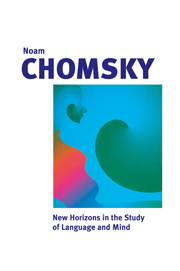Book contents
- Frontmatter
- Contents
- Foreword by Neil Smith
- Acknowledgements
- Introduction
- 1 New horizons in the study of language
- 2 Explaining language use
- 3 Language and interpretation: philosophical reflections and empirical inquiry
- 4 Naturalism and dualism in the study of language and mind
- 5 Language as a natural object
- 6 Language from an internalist perspective
- 7 Internalist explorations
- Notes
- References
- Index
6 - Language from an internalist perspective
Published online by Cambridge University Press: 05 June 2012
- Frontmatter
- Contents
- Foreword by Neil Smith
- Acknowledgements
- Introduction
- 1 New horizons in the study of language
- 2 Explaining language use
- 3 Language and interpretation: philosophical reflections and empirical inquiry
- 4 Naturalism and dualism in the study of language and mind
- 5 Language as a natural object
- 6 Language from an internalist perspective
- 7 Internalist explorations
- Notes
- References
- Index
Summary
I would like to expand on some remarks on the study of language and mind presented earlier in this book, especially in Chapter 5. To begin with, I want to distinguish an internalist from a naturalistic approach. By the latter I mean just the attempt to study humans as we do anything else in the natural world. Internalist naturalistic inquiry seeks to understand the internal states of an organism. Naturalistic study is of course not limited to such bounds; internalist inquiry into a planet or an ant does not preempt or preclude the study of the solar system or an ant community. Non-internalist studies of humans can take many forms: as phases in an oxygen-to-carbon-dioxide cycle or gene transmission, as farmers or gourmets, as participants in associations and communities, with their power structures, doctrinal systems, cultural practices, and so on. Internalist studies are commonly presupposed in others with broader range, but it should be obvious that the legitimacy of one or another kind of inquiry does not arise.
To clarify further, I am keeping here to the quest for theoretical understanding, the specific kind of inquiry that seeks to account for some aspects of the world on the basis of usually hidden structures and explanatory principles. Someone committed to naturalistic inquiry can consistently believe that we learn more of human interest about how people think and feel and act by studying history or reading novels than from all of naturalistic inquiry.
Information
- Type
- Chapter
- Information
- New Horizons in the Study of Language and Mind , pp. 134 - 163Publisher: Cambridge University PressPrint publication year: 2000
Accessibility standard: Unknown
Why this information is here
This section outlines the accessibility features of this content - including support for screen readers, full keyboard navigation and high-contrast display options. This may not be relevant for you.Accessibility Information
- 3
- Cited by
